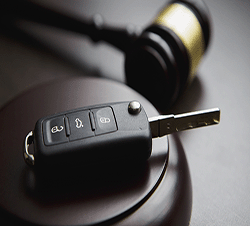Colorado Traffic Court Records Search
Traffic court in Colorado is a specialized court where individuals address violations of state traffic laws, ranging from minor criminal driving infractions to more serious DUI offenses that lead to an arrest. Traffic citations are commonly issued for various driving-related offenses, and while most traffic citations are considered small infractions, others like driving under the influence (DUI) can rise to the level of criminal misdemeanors and sometimes felonies. If you've received a traffic citation in Colorado, it’s important to understand the types of violations, how to look up your citation, and how you might challenge it in court.
Types of Traffic Citations in Colorado
Traffic citations in Colorado are issued for a wide variety of offenses. These offenses can range from simple violations of the rules of the road to more serious offenses that can result in criminal charges. Generally, traffic citations can be categorized into three types: infractions, misdemeanors, and felonies. Most traffic citations are infractions, but some more serious violations can result in criminal charges. Here is a breakdown of the various types of driving violations:
Infractions: Infractions are the most common type of traffic violation and typically result in a fine rather than criminal charges. Common infractions include:
1). Speeding: Exceeding the posted speed limit.
2). Failure to stop: Not stopping at a stop sign or red light.
3). Improper lane changes: Changing lanes without signaling or inappropriately.
4). Expired registration: Driving a vehicle with expired tags.
5). Running a red light or stop sign: Disregarding traffic signals.
Misdemeanors: Some traffic violations are classified as misdemeanors, which are more serious than infractions but less severe than felonies. Misdemeanors carry potential criminal penalties, including fines, jail time, or both. In Colorado, common traffic misdemeanors include:
1). Driving Under the Influence (DUI): Operating a vehicle with a blood alcohol content (BAC) over the legal limit (0.08% or higher).
2). Driving While Ability Impaired (DWAI): Driving with a BAC between 0.05% and 0.08% or under the influence of drugs.
3). Reckless driving: Operating a vehicle in a manner that shows willful disregard for the safety of others is considered reckless driving.
4). Driving with a revoked or suspended license: Driving after your driver's license has been suspended or revoked.
Felonies: Felony traffic offenses, though rare, do occur. These are the most serious violations and include things like vehicular homicide or leaving the scene of an accident (hit and run) when someone is seriously injured or killed. Felony charges carry the possibility of long-term prison sentences and significant fines.
For most infractions, you’ll likely receive a fine and may have the option to pay the fine online or by mail, which can resolve the issue without appearing in court. However, if you choose to contest the citation, you must appear before a judge. Misdemeanors carry more serious penalties and consequences than infractions, including potential jail time, increased fines, and a criminal record. DUI offenses, for example, can result in mandatory alcohol education classes, probation, or even prison time, depending on the severity and whether it is a repeat offense.
How to Lookup a Colorado Traffic Ticket
If you’ve received a traffic ticket n in Colorado, you’ll need to know how to find relevant case information. Here are steps you can take to lookup your citation online:
1). Check the Citation: When you receive a traffic citation, it should contain detailed information about the offense, including the citation number, date of the offense, and court date. This information is critical when you look up your case.
2). Colorado Courts E-Filing System (ICCES): The Colorado Judicial Branch provides an online tool called the Integrated Colorado Courts E-Filing System (ICCES) where you can search for your traffic case. You can use the case number, your name, or the ticket number to look up details about the citation and the status of your case.
3). Contact the Court Clerk: If you prefer to speak with someone or need additional assistance, you can contact the clerk’s office at the local court where your ticket was issued. The clerk can provide information on how to pay the fine, contest the ticket, or request a hearing.
4). Use Third-Party Websites: There are various third-party websites that can assist you in looking up your Colorado traffic citation. Some sites offer to look up citations for a fee, but it's important to verify the accuracy and legitimacy of these sites before using them.
How to Fight a Traffic Citation in Colorado
If you believe that you were wrongly cited for a traffic violation or if there were mitigating circumstances, you have the right to contest the citation in court. Here’s how to approach fighting a traffic citation in Colorado:
1). Review the Citation: Before deciding to contest the ticket, carefully review all the details on the citation. Are the facts correct? Is the date, time, or location of the violation accurate? Were there any errors in the citation that might help your case? If the officer made a mistake, it could be grounds for dismissal.
2). Decide Whether to Plead "Not Guilty": In Colorado, you can plead not guilty to a traffic violation and request a hearing. If you opt to contest the ticket, you must appear in court. At the hearing, you will have the opportunity to present evidence and question the officer or any witnesses.
3). Gather Evidence: To effectively contest the citation, you will need evidence that supports your case. Some examples of helpful evidence might include picture or videos of the road conditions, or traffic signs. Witness statements, and expert testimony can also be helpful.
4). Prepare Your Defense: Depending on the violation, your defense strategy may vary. For example, if you were cited for speeding, you might argue that the speedometer was malfunctioning or that you were not speeding in the area where the officer claimed. For a DUI charge, you may challenge the results of the breathalyzer test or argue that the officer did not have reasonable suspicion to pull you over.
5). Consider Legal Representation: If you’re facing a more serious violation, such as a DUI or reckless driving charge, it may be in your best interest to consult with an attorney who specializes in traffic law. An experienced lawyer can help you understand the legal complexities, negotiate plea deals, and represent you in court.
6). Attend the Court Hearing: If you choose to contest the citation, you’ll be required to appear in court on the specified date. During the hearing, the prosecution (typically the officer who issued the citation) will present evidence against you, and you will have the opportunity to defend yourself. Be respectful, present your evidence clearly, and stay focused on the facts.
How Do I Lookup My Colorado Traffic Ticket?
You can either visit the Colorado DMV website to lookup your traffic ticket by name, citation number, or license plate number, or you can use a third party public records website. The third party option will also allow you to lookup all of your traffic tickets, and find out how many points you have on your driving record.
Will a DUI Show Up on a Colorado Background Check?
Yes, since they are considered criminal records, which are either misdemeanors or felonies, they will show up on a background check. This means that a DUI conviction is publicly available information for anyone to find online.
Can I Fight a Colorado Springs Traffic Ticket From a Traffic Camera?
Yes, you will need to gather as much evidence as possible, as well as the traffic camera footage, the road conditions, and any relevant traffic signs to show that you were not at fault. There are many Colorado Springs traffic cases that have been dismissed from issues with the cameras, or weather conditions that make the road signs difficult to see. You may want to consider hiring an attorney to help you with fighting your traffic ticket.


